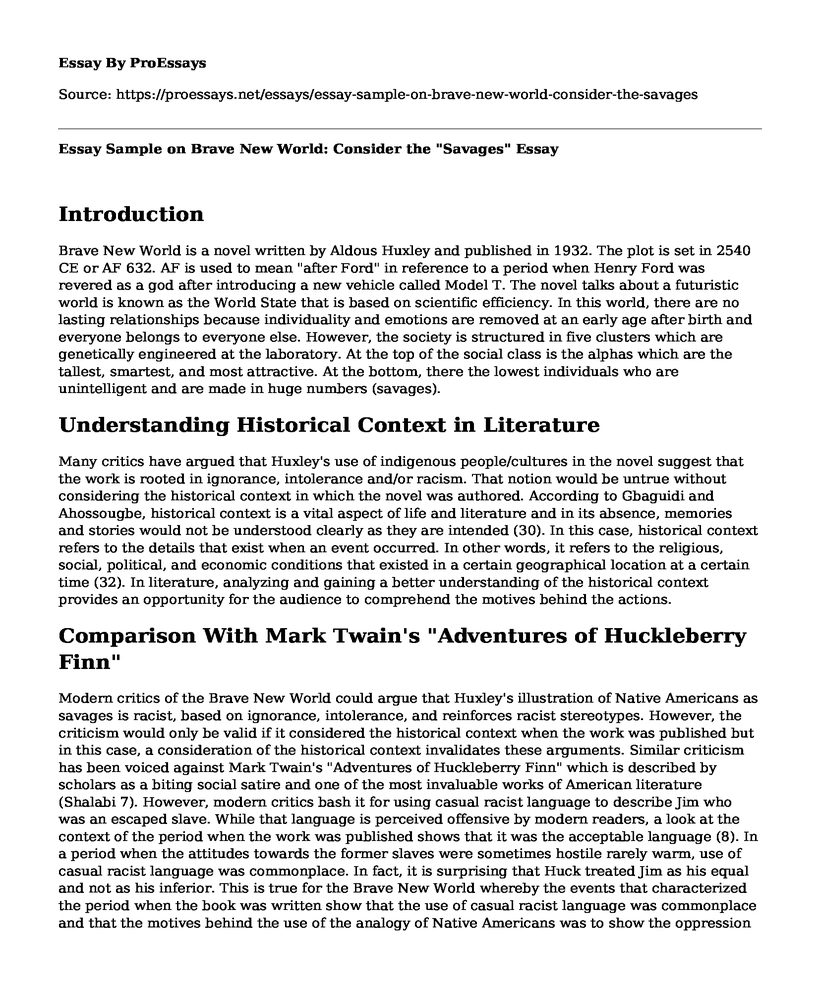Introduction
Brave New World is a novel written by Aldous Huxley and published in 1932. The plot is set in 2540 CE or AF 632. AF is used to mean "after Ford" in reference to a period when Henry Ford was revered as a god after introducing a new vehicle called Model T. The novel talks about a futuristic world is known as the World State that is based on scientific efficiency. In this world, there are no lasting relationships because individuality and emotions are removed at an early age after birth and everyone belongs to everyone else. However, the society is structured in five clusters which are genetically engineered at the laboratory. At the top of the social class is the alphas which are the tallest, smartest, and most attractive. At the bottom, there the lowest individuals who are unintelligent and are made in huge numbers (savages).
Understanding Historical Context in Literature
Many critics have argued that Huxley's use of indigenous people/cultures in the novel suggest that the work is rooted in ignorance, intolerance and/or racism. That notion would be untrue without considering the historical context in which the novel was authored. According to Gbaguidi and Ahossougbe, historical context is a vital aspect of life and literature and in its absence, memories and stories would not be understood clearly as they are intended (30). In this case, historical context refers to the details that exist when an event occurred. In other words, it refers to the religious, social, political, and economic conditions that existed in a certain geographical location at a certain time (32). In literature, analyzing and gaining a better understanding of the historical context provides an opportunity for the audience to comprehend the motives behind the actions.
Comparison With Mark Twain's "Adventures of Huckleberry Finn"
Modern critics of the Brave New World could argue that Huxley's illustration of Native Americans as savages is racist, based on ignorance, intolerance, and reinforces racist stereotypes. However, the criticism would only be valid if it considered the historical context when the work was published but in this case, a consideration of the historical context invalidates these arguments. Similar criticism has been voiced against Mark Twain's "Adventures of Huckleberry Finn" which is described by scholars as a biting social satire and one of the most invaluable works of American literature (Shalabi 7). However, modern critics bash it for using casual racist language to describe Jim who was an escaped slave. While that language is perceived offensive by modern readers, a look at the context of the period when the work was published shows that it was the acceptable language (8). In a period when the attitudes towards the former slaves were sometimes hostile rarely warm, use of casual racist language was commonplace. In fact, it is surprising that Huck treated Jim as his equal and not as his inferior. This is true for the Brave New World whereby the events that characterized the period when the book was written show that the use of casual racist language was commonplace and that the motives behind the use of the analogy of Native Americans was to show the oppression that would take place just like the Indians were oppressed by the Europeans when they arrived in America. Therefore, without the consideration of the historical context, the interpretation would be misleading.
Conclusion
The use of Native Americans as savages is by no means coincidence or mistake. The novel describes the savages (people who belong to the lowest socioeconomic class) in a manner that portrays them as people of color, in particular, the Native Americans. The atrocities and oppression against the savages is similar to that committed by the early travelers and settlers in America who killed, took away their property, raped, and committed other forms of oppression against the Native Americans (History.com Editors). Although there are some people of color in the Alphas and the Betas, they are few and the significant majority comprises of Whites, who oppress the savages, just like when the Native Americans and people of color were oppressed.
Works Cited
Celestin gbaguidi, Franck ahossougbe, Interrogating the Historical and Cultural Context of Chinua Achebe's Things Fall Apart International Journal on Studies in English Language and Literature 2018, 6(8) : 30-38
Editors, History.com. "Native American History Timeline." HISTORY, 15 Jan. 2019, www.history.com/topics/native-american-history/native-american-timeline.
Huxley, Aldous. "Brave New World. 1932." London: Vintage(1998).
Shalabi, Ibrahim. "Social Criticism in Mark Twain's: The Adventures of Huckleberry Finn." International Journal on Studies in English Language and Literature, vol. 4, no. 12, 2016, pp. 7-12.
Cite this page
Essay Sample on Brave New World: Consider the "Savages". (2022, Mar 25). Retrieved from https://proessays.net/essays/essay-sample-on-brave-new-world-consider-the-savages
If you are the original author of this essay and no longer wish to have it published on the ProEssays website, please click below to request its removal:
- Personal Essay Example: Identity and Socialization
- Theme of Loneliness in the Novel Frankenstein by Mary Shelley Essay
- "Sonnet 130" by William Shakespeare Essay
- My Life as a Writer - Essay Sample
- Jane Austen: The Role of Parenthood in Mansfield Park and Persuasion Paper Example
- Essay Example on Theme Comparison of The Street and A Rose for Emily
- Essay Example on Sherlock Holmes & Dr. Watson: Solving Mysteries Together







